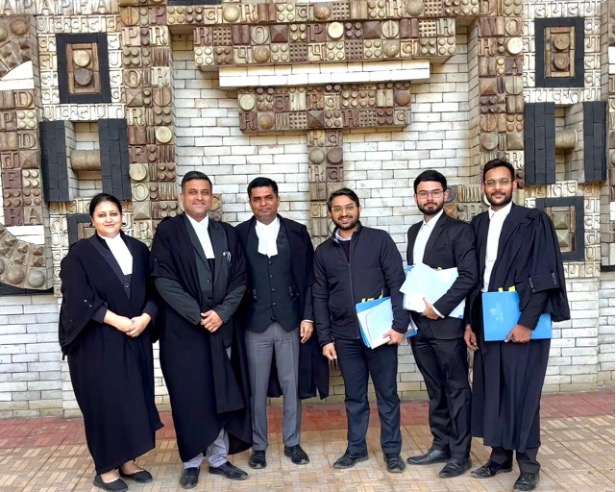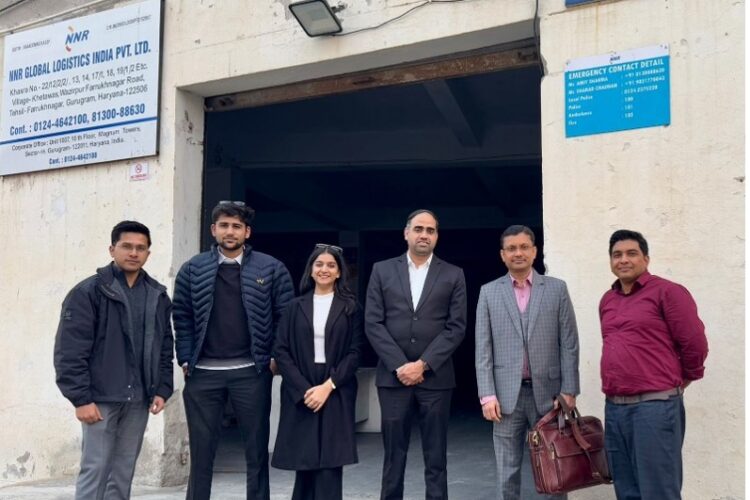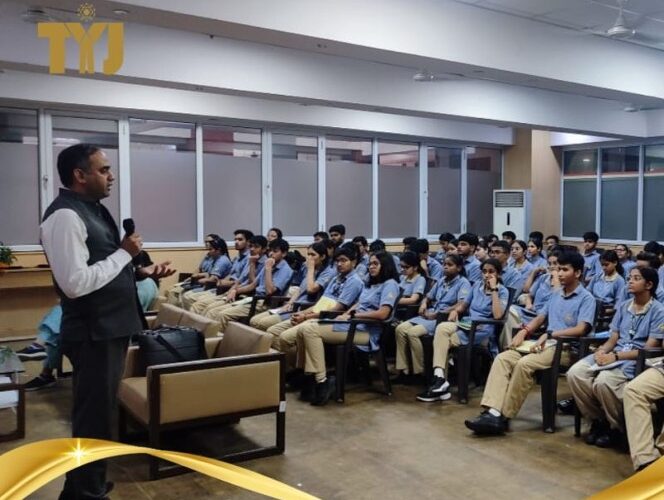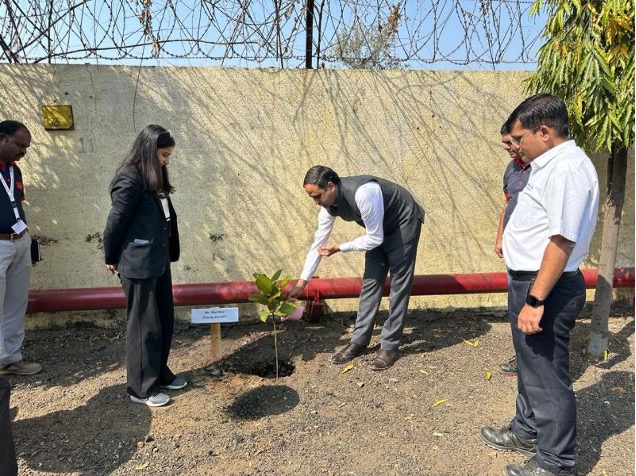January 30, 2025
TYJ Delhi Litigation Team Secures Stay Order from Hon’ble Delhi High Court

The Litigation Team at The Young Jurist (TYJ), New Delhi, has successfully represented a client in a complex banking legal matter before the Hon’ble High Court of Delhi. Demonstrating precision and preparation, the team secured a stay order at the very first hearing of the case.
This significant outcome underscores TYJ’s unwavering commitment to protecting client interests through strategic, efficient, and result-driven legal advocacy.
The matter was skillfully argued by Mr. Apoorv Kurup, Senior Advocate, with able assistance from Mr. Ritesh Khare and Ms. Nikita Anand. The TYJ Delhi team was led by Mr. Ritin Purohit, and ably supported by Mr. Yash Raj and Mr. Mukul Vats.
January 26, 2025
Empowering Workplaces Through POSH Training



Creating a safe and secure workplace isn’t just a goal—it’s the foundation for transformative and lasting change.
The Young Jurist (TYJ) is proud to have successfully conducted a comprehensive POSH (Prevention of Sexual Harassment) at Workplace Training for the employees of our TSE-listed client, MISUMI INDIA, in our capacity as External Legal Members of their Internal Complaints Committee (ICC).
This impactful session was made possible through the dedicated efforts of Ms. Mehjaveen Marak, ICC Member, and Ms. Niharika Gupta, Senior Associate at TYJ, whose insights and guidance played a vital role in the training’s success.
At TYJ, we are committed to fostering safe, inclusive, and respectful workplace environments. Initiatives like these not only strengthen compliance but also empower organizations to build cultures where every employee feels valued, protected, and motivated to thrive.
January 24, 2025
Strengthening Partnerships Through On-Site Engagement


At The Young Jurist (TYJ), we believe that truly effective legal solutions begin with a deep understanding of our clients’ business environments. Our recent visit to the office and warehouse of our valued global client, Topcon Sokkia India Private Limited, was a significant step in reinforcing this approach.
This on-ground interaction enabled us to gain valuable insights into their operational and compliance frameworks, align more closely with their strategic goals, and offer legal guidance that is both practical and tailored to their industry.
We were particularly inspired by Topcon’s unwavering commitment to innovation and precision, reflected in their use of advanced, globally recognized technologies. Their dedication to excellence sets a benchmark in their sector.
Together, we continue to champion the principles of integrity, regulatory compliance, and sustainable growth.
October 24, 2024
Strengthening Compliance: TYJ Successfully Conducts EPR & BIS Audits for Japanese Client

At The Young Jurist (TYJ), we are pleased to share that our Corporate & Compliance Team has successfully conducted Extended Producer Responsibility (EPR) and Bureau of Indian Standards (BIS) audits as part of our regular engagements with one of our valued Japanese clients, MISUMI INDIA.
In line with our commitment to delivering legal and regulatory excellence, we thoroughly review the client’s operational framework to ensure alignment with applicable environmental mandates and BIS quality standards. This includes a comprehensive evaluation of internal systems, procedures, and documentation.
We also conduct detailed compliance analyses under the relevant laws and regulations to identify potential gaps or vulnerabilities. Our findings are supported by well-documented observations and recommendations.
Based on this assessment, we provide actionable legal and strategic insights to address compliance gaps and mitigate risks effectively. Our approach ensures that businesses are not only compliant but also positioned to build trust and long-term sustainability in their operations.
September 24, 2024
TYJ Conducts Legal Awareness Workshop at Salwan Public School


While The Young Jurist (TYJ) is often engaged by universities and organizations for knowledge sessions, seminars, placements, and professional guidance, this time, we had the unique opportunity to interact with the bright young minds of Salwan Public School, one of Delhi’s most prestigious institutions.
We are truly delighted to witness such forward-thinking initiatives aimed at introducing students to the field of law at an early stage—helping them explore future career possibilities and build a strong foundation in legal awareness.
A special note of thanks to Salwan Public School, Capt. Richa Sharma Katyal, and Mr. Dheerendra B. Singh for inviting us to conduct this dynamic and engaging workshop.
Our Partner, Mr. Raj Dev Singh, along with Ms. Niharika Gupta, shared invaluable insights into the significance of understanding legal principles, the essential role lawyers play in society, and the wide range of career paths within the legal profession.
Such meaningful collaborations go a long way in nurturing talent and inspiring the next generation of legal professionals.
The Young Jurist (TYJ) is proud to be part of this impactful initiative.
May 24, 2024
TYJ Participates in Tata Motors’ ESR Initiative



Strengthening Partnerships Beyond Compliance
During a recent visit to Tata Motors, our team at The Young Jurist (TYJ) had the opportunity to go beyond our core objectives of compliance assurance and due diligence by actively engaging in the company’s Environmental and Social Responsibility (ESR) initiatives.
As a thoughtful gesture, Tata Motors organized a tree-planting event for our team—a symbolic and meaningful act that highlights the importance of sustainability and shared responsibility.
This collaborative effort not only strengthens our professional relationship with Tata Motors but also reflects our mutual commitment to creating a positive impact that extends beyond regulatory obligations.
At TYJ, we believe that true progress lies in partnerships built on shared values. As a service provider, we remain dedicated to supporting our clients in driving sustainable, ethical, and socially responsible practices.
January 14, 2024
TYJ Successfully Conducts Legal Compliance Audit for FMCG Client



We are pleased to share that The Young Jurist (TYJ) recently conducted a comprehensive legal compliance audit for one of our esteemed clients in electronic manufacturing sector, marking a key achievement for our corporate legal team.
This assignment offered significant insights into the regulatory framework governing product labelling and packaging—an essential component of consumer compliance that directly impacts market transparency and legal conformity.
One of the key focus areas of the audit was the Principal Display Panel (PDP), which functions as the “face” of pre-packaged goods. It is critical that the PDP accurately reflects all mandatory information, including net weight, maximum retail price, and manufacturer details, in a clear and compliant manner. Effective packaging should inform, not confuse.
February 2, 2023
KEY HIGHTLIGHTS OF THE UNION BUDGET, 2023



“The Union Budget of 2023 hopes to build on the foundation laid in the previous budget, and the blueprint drawn for India@100. We envision a prosperous and inclusive India, in which the fruits of development reach all regions and citizens, especially our youth, women, farmers, IBCs, Scheduled Castes and Scheduled Tribes” – Smt. Nirmala Sitharaman, Finance Minister
Here are the Key Highlights of the Budget for certain industries presented by our Jurists Krishna Ramanathan and Nishtha Kansal:
#finance #development #india #unionbudget2023 #unionbudget #financeminister #financeministry #legal #legalnews #highlights
January 18, 2023
Legal Metrology Audit at STL – Sterlite Technologies Limited (STL), Silvassa, Daman


We, the team at The Young Jurist (TYJ), are elated to be sharing that we have successfully conducted the physical audit in Silvassa, Daman under the legal metrology and allied provisions of laws, for STL – Sterlite Technologies Limited (STL), for its digital networks All-in 5G solutions. We have been accomplishing this exercise for several manufacturing companies on a regular basis for years. Our team is constantly looking forward to pursuing these physically hectic but well satisfactory tasks, for, the very change it brings from the operational floor of the law offices and courtrooms.
Thank you to the core team Krishna Ramanathan, Nishtha Kansal, Vasundhara Asthana and Manan Agarwal also special mention and our heartfelt gratitude towards our intern Kushagra Singh.
TYJ is proud to be associated with STL, which is one of the industry’s leading integrators of digital networks providing All-in 5G solutions. Their capabilities across optical networking, services, software, and wireless connectivity place us amongst the top optical players in the world. Wishing STL many more years of successful operations in Indian and overseas market!
January 17, 2023
Labour Arbitration and Commercial Arbitration: A Comparative Analysis – Authored by Krishna Ramanathan (Jurist)
Since its independence from the British Regime in 1947, India throughout its formative years of development has developed a societal consciousness. Because of this socio-economic welfare became one of the most important aspects of the governing body of the state. With the damage of World War II still wandering around, a tidal wave of unemployment and trade union movements coming up and about, the need for state intervention in favor of labourers was ploughed through.[1] Keeping that in mind, the Industrial Disputes Act of 1947 was enacted to lay down the framework and guidelines which can be used to provide methods of investigation and settlement of industrial disputes2. Industrial Disputes Act provided a sense of empowerment to the ‘workmen’ to use its mechanisms effectively against the oppressive tactics of employers. Under the Industrial Disputes Act, they can file against a lot of threatening issues ranging from payment of their wages to employment benefits and especially illegal and unfair labour practices. It can be said that Industrial Disputes Act is the primary legislation in India which is enacted to provide a harmonious relationship between the employers and the employees in the industrial setting.
Section 10(a) of the Industrial Disputes Act provides for voluntary reference of an industrial dispute between an employer and an employee to arbitration. It states that “Where any industrial dispute exists or is apprehended and the employer and the workmen agree to refer the dispute to arbitration, they may, at any time before the dispute has been referred under section 10 to a Labour Court or Tribunal or National Tribunal, by a written agreement, refer the dispute to arbitration and the reference shall be to such person or persons (including the presiding officer of a Labour Court or Tribunal or National Tribunal) as an arbitrator or arbitrators as may be specified in the arbitration agreement.” Section 10(a) also provides certain provisions to prohibit union strikes and lockouts during the pendency of the arbitral proceedings.
In the past, the application of the Arbitration Act of 1940 was expressly excluded from the Industrial Disputes Act of 1947 in order to “voluntary reference disputes to arbitration” under it. However, the same has since been repealed by the Arbitration and Conciliation Act of 1996.[2] Since Arbitration and Conciliation Act is considered to be a latter statute and Industrial Disputes Act is considered to be a special statute, it raises the question of which of the two acts should prevail. This matter is considered to be classified only through judicial pronouncement or a legislative amendment which changes the wordings of “Arbitration Act of 1940” to “Arbitration and Conciliation Act of 1996”.
The Arbitration and Conciliation Act of 1996 does not expressly address the question of what category of disputes are arbitrable and which are not. Furthermore, the same question has risen in front of the Indian Judicial system in a variety of contexts. In recent times, the question of arbitrability of certain disputes on the matters of fraud and disputes arising between shareholders and intellectual property litigation have been answered by the Indian courts, however, the matter of labour and industrial disputes is still up in question whether they are arbitrable under Arbitration and Conciliation Act of 1996 or not. It has been answered by the Indian courts in some sense that the industrial and labour disputes are not arbitrable under Arbitration and Conciliation Act. Furthermore, these judgments have raised the question of insertion of arbitration clauses in employment agreements.
In the case of Kingfisher Airlines v. Captain Prithvi Malhotra and Others[3], the case was filed due to various labour recovery proceedings instituted by pilots and staff members of the now defunct Kingfisher Airlines. It was contended by the pilots and the staff that the proceedings were instituted before the specially empowered labour courts for the recovery of their unpaid wages and other employment salary benefits. Kingfisher Airlines contested the same by invoking Section-8 of the Arbitration and Conciliation Act which states that “Power to refer parties to arbitration where there is an arbitration agreement.—
1. A judicial authority before which an action is brought in a matter which is the subject of an arbitration agreement shall, if a party so applies not later than when submitting his first statement on the substance of the dispute, refer the parties to arbitration.
2. The application referred to in sub-section (1) shall not be entertained unless it is accompanied by the original arbitration agreement or a duly certified copy thereof.
3. Notwithstanding that an application has been made under sub-section (1) and that the issue is pending before the judicial authority, an arbitration may be commenced or continued and an arbitral award made.”[4]
The same application was rejected by the Labour court which retained its own jurisdiction over the proceedings. Aggrieved by the said order, Kingfisher Airlines decided to move to the Hon’ble Bombay High Court to challenge the order passed by the labour court. The Hon’ble Bombay High Court decided to affirm the order passed by the Labour Court, therefore, maintaining the stance that labour disputes were not arbitrable under the Arbitration and Conciliation Act of 1996. The Hon’ble Bombay High Court further provided justification by stating that the inquiry was not solely based on whether the claim being urged was in personem or in rem which was held by the Apex Court in Booze Allen & Hamilton v. SBI Home Finance[5], but whether the resolution of the claim was exclusively reserved for adjudication by a particular court or tribunal for public policy reasons. The Hon’ble Bombay High Court held that the resolution of labour and industrial disputes have been reserved for resolution before the judicial fora constituted under the Industrial Disputes Act of 1947. The Hon’ble Bombay High Court in its judgement also examined the scheme of Industrial Disputes Act and concluded that the Industrial Disputes Act provides for a unique process of Arbitration for collective labour claims. The court therefore concluded that if there were to be adjudication of labour and industrial claims outside of the purview of the courts or tribunals under the Industrial Disputes Act then the reference to and resolution by arbitration would have to be governed by the specific provisions of the Industrial Disputes Act of 1947 and not the Arbitration and Conciliation Act of 1996.[6]
It was confirmed by the Bombay High Court in this case that the claims under the Industrial Disputes Act of 1947 are not arbitrable under the Arbitration and Conciliation Act of 1996. However, if some cases are arbitrable then they have to conform with the requirements and procedures laid down by the Industrial Disputes Act.
In other countries such as the United States of America, there has been a running debate whether commercial arbitration and labour arbitration should be merged together or not. Labour arbitration in United States refers to arbitration in unionized workplaces, referring to only unionized employees and their management. Labour Management Relation Act (LMRA) is the primary source of law regulating labour arbitration, in specific, Section-301 which states that “Suits for violation of contracts between an employer and a labour organization representing employees in an industry affecting commerce as defined in this chapter, or between any such labour organizations, may be brought in any district court of the United States having jurisdiction of the parties, without respect to the amount in controversy or without regard to the citizenship of the parties”[7] In comparison, Commercial Arbitration law covers a vast area of agreements ranging from agreements between merchants, consumers, management and nonunionized employees. The Federal Arbitration Act is the primary source of law in these types of disputes.[8] It was understood that the Labour Management Relations Act and Federal Arbitration Act were developed on parallel tracks. However the two have somehow managed to converge onto similar tracks.
In similar fashion, in India, if the labour arbitration law which is the Industrial Disputes Act of 1947 is merged with the Arbitration and Conciliation Act of 1996, then the former would lose its credibility. With the industrial sector with unionized employees facing discrimination on a regular basis, the only governing law protecting them and their employment interest would be hampered. Since most of the labour sector comes from poverty hit background, the present law is as it is not well known to the populace. If the said law was meant to be removed and the commercial arbitration law i.e., Arbitration and Conciliation Act of 1996 was implemented over them, they the power to submit claims in front of an arbitrator as a power tool of collective bargaining would be lost. Industrial Disputes Act of 1947 provides the employee unions a blanket of safety by providing proper framework and procedures to settle their dispute with their employer. If the said Industrial Disputes Act of 1947 is removed, then the employers or the management would gain the power of appointing their own arbitrator which would work for their own benefit.
If there was any motion to commercialize labour disputes then it would cause a havoc of problems. Labour disputes are governed by Industrial Disputes Act of 1947, if they were to be commercialized then it would mean that they would fall under the ambit of Arbitration and Conciliation Act of 1996 which would further result in labour arbitration becoming a substitute for litigation. Hence, it would be in everyone’s good interest if the same is not commercialized and the sanctity of Industrial Disputes Act of 1947 is maintained to be what it is, a power tool for safeguarding the unions from losing their employment benefits.
[1] Teamwork, ‘Brief History of India: Ancient, Medieval and Modern History’ (Important India, February 13,
2017) <https://www.importantindia.com/25677/brief-history-of-india/> accessed 09 December 2020 2 Statement of Objects and Reasons, Industrial Disputes Act 1947
[2] Section 85, Arbitration and Conciliation Act of 1996.
[3] Kingfisher Airlines v. Captain Prithvi Malhotra and Others, 2013 BOMCR 7 738
[4] Section 8, Arbitration and Conciliation Act of 1996
[5] Booze Allen & Hamilton v. SBI Home Finance, 2011 AIR SC 2507
[6] Kingfisher Airlines v. Captain Prithvi Malhotra and Others, 2013 BOMCR 7 738
[7] Stephen L. Hayford, The Federal Arbitration Act: Key to Stabilizing and Strengthening the Law of Labour Arbitration, 21 BERKELEY JOURNAL OF EMPLOYMENT AND LABOUR LAW 521-574 (2000)
[8] Stephen L Hayford, Unification of the Law and Labour Arbitration and Commercial Arbitration: An Idea Whose Time Has Come, 124 YALE LAW JOURNAL 781-783 (2015)











